Illustration by Pradnya J
To the temple on the island
Was always late
Dependent as she was
On the whims of the boatman
Sunderarajan Venkatavaradan (SV, H7, 820448) is an ex-IITian. He earned a B.Tech in Electrical Engineering ('86). He writes at https://medium.com/dil-se
Illustration by Pradnya J
To the temple on the island
Was always late
Dependent as she was
On the whims of the boatman
Illustration by Harshita Bandodkar
Pandora’s box is open
And the -ism’s are flying about
Nationalism has bitten her quite badly
Her friend has been stung by Doubt.
The -ism’s are creating schisms
Between him and me and you
Is there any remedy for this?
What is the best thing to do?
Try and get stung by Kindness
And we may well be able to cope
Open the box again quickly
And let out poor, trapped, Hope.
Artwork by Rajat Patle
Illustration by Nilapratim Sengupta
The universe is made up of not only atoms but also stories. So when I was asked to write for the Climate Change issue of Fundamatics, I knew I would have to write our story, about our small bit of the universe, which would then become a small cog in our small bit of the universe.
Some years ago, we had a visitor, who asked us how we had managed to acquire Forest land. Had we just squatted on it? Or had we managed to acquire a patta of some sort?
It took us a while to convince him that the forest came after we did. And we realised that we ourselves hadn’t seen the wood for the trees.
When Sonati and I moved here 20 years ago with a two-and-a-half-year-old Badri Baba, it was to grow our children up away from the city.
The land was chosen (by both of us independently) almost whimsically: “What a lovely view!”
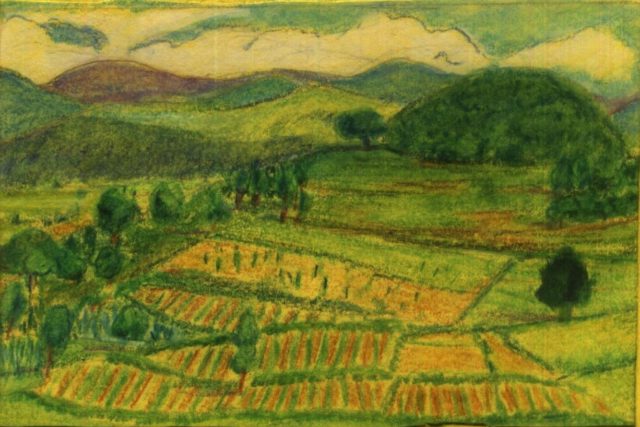
The land was on a hill, grazed to death; and all the trees hacked for firewood. Where would the water come from? Didn’t daunt us.
Recklessnes? Youthful energy? Perhaps both; perhaps.
There’s a divinity that shapes our ends,
Rough-hew them how we will.
Otherwise, given the difficulties with water, the barrenness, the rockiness, no-one may have bought this piece of land.
The House in 2000
And since we did, the land has now become green, and treed-up. Various birds have moved in which we never saw here earlier.
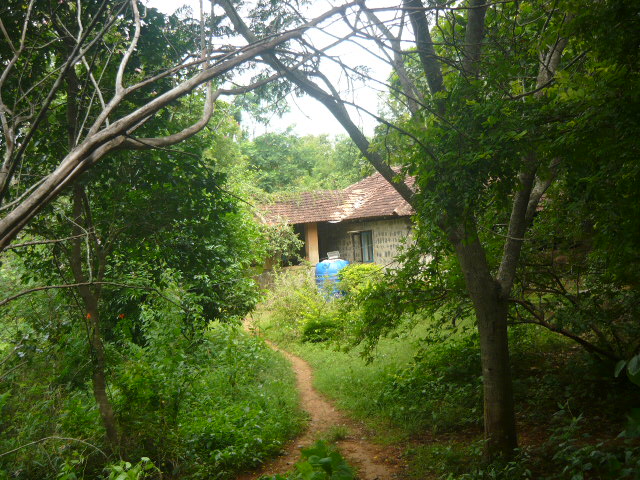
The House in 2020
We have seen slender lorises (we hear them oftener than we see them), and a family of mongooses. (And Varun Baba, too moved in!)
Various neighbours steal various things: Jackfruit, Guavas (though of late we have had a relentless stream of kids who actually come and ask for Guavas. The squirrels don’t ask), Firewood, Timber wood, the land itself by pushing boundaries.
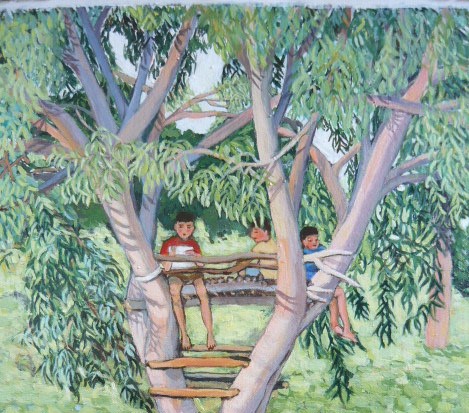
I seem to have moved to the end of the story so far, skipping over various intermediate stories. But that is just like a story; it takes on a life of its own.
Much like our land, which too seems to have a mind of its own.
We tried so many things: We grew rice (rainfed), ragi (rainfed), dal (rainfed), til for oil (rainfed). The trouble was that our neighbours had started growing cash crops (tapioca: Salem is the tapioca capital of the world). The upshot: All the rats grazed on our tastier crops, and would leave the husk for us to estimate how much they had eaten. To add insult to injury, after we harvested our crops, the rats would start eating tapioca for want of anything else: And our neighbours would say, “Saar, your rats have come to our fields”
So…
When the rats were consuming 80% of our crop before we could harvest it.
We had to give up growing rat food.
Then we planted out trees: fruit trees, flowering trees, timber trees; and of course, the native trees which grew back from hacked stumps, since we stopped people grazing and collecting firewood on our land.
Our trees were also all rainfed: we had to plant at the right time and pray. We used to get two monsoons (July to September is the short-rainy season, October-November is the long-rainy season) and also some January rains and some April rains, so we didn’t have to pray too much.
In the last four years, the rains have been pathetic. Not a drop of rain from end of November to the following July. And the monsoons too giving half our normal rainfall.
So we can say categorically that no tree amongst the thousands of our standing trees has been planted between 2015 to 2019. Not one of those survived.
To take that a bit further, we need to say that growing trees needs help from the universe. Had we arrived here 15 years later than we did, we may have thought that this hillside was a dead loss. And a small bit of the universe would have stayed barren.
This may seem anecdotal evidence for climate change. But now there are plenty of such stories, kilo-anecdotes if you will. We need to make the connections and alter our behaviour. After all, if a Pangolin’s sneeze can grind the whole (human) world to a halt, the universe is capable of taking corrective action with or without our help. Perhaps one of our favourite poems from Wendell Berry will sum it up:
Geese appear high over us,
pass, and the sky closes. Abandon,
as in love or sleep, holds
them to their way, clear
in the ancient faith: what we need
is here. And we pray, not
for new earth or heaven, but to be
quiet in heart, and in eye,
clear. What we need is here.
Illustration by Nilapratim Sengupta
When I am out
Pitting
And planting trees
I rue the time
Away from my desk:
I could have been
Writing poetry
I think
When I am
At my desk
Writing
I rue the time
Away from the pits:
I could have been planting trees
I think
But then it strikes me
That in the battle against
Climate Change
Both trees and poetry
Are necessary
Who knows whether
My hundredth poem or
My hundredth tree
Will make me
The hundredth monkey
Illustration by Nilapratim Sengupta
We (Sunder and Sonati) have spent much of the last twenty years in growing trees and our children, here in Thekambattu. No time for anything much else than housework, land work, the kids and visitors. Now, with the boys grown up, and the trees to some extent, there was time for poetry.
The poetry started as a response to the events in Kashmir. (How does one respond? has been a recurring theme in our lives). The Kashmir poems more or less wrote themselves, and this continued with the corona poems and generally all the poems all of which have been written in the last year since August 5th. I (Sunder) write the poems and Sonati edits them to tone down the rants or to suggest a more elegant point of view.
Hope that these poems make you pause, think, enjoy the poetry and get you to write some poems of your own. The world needs more poets.
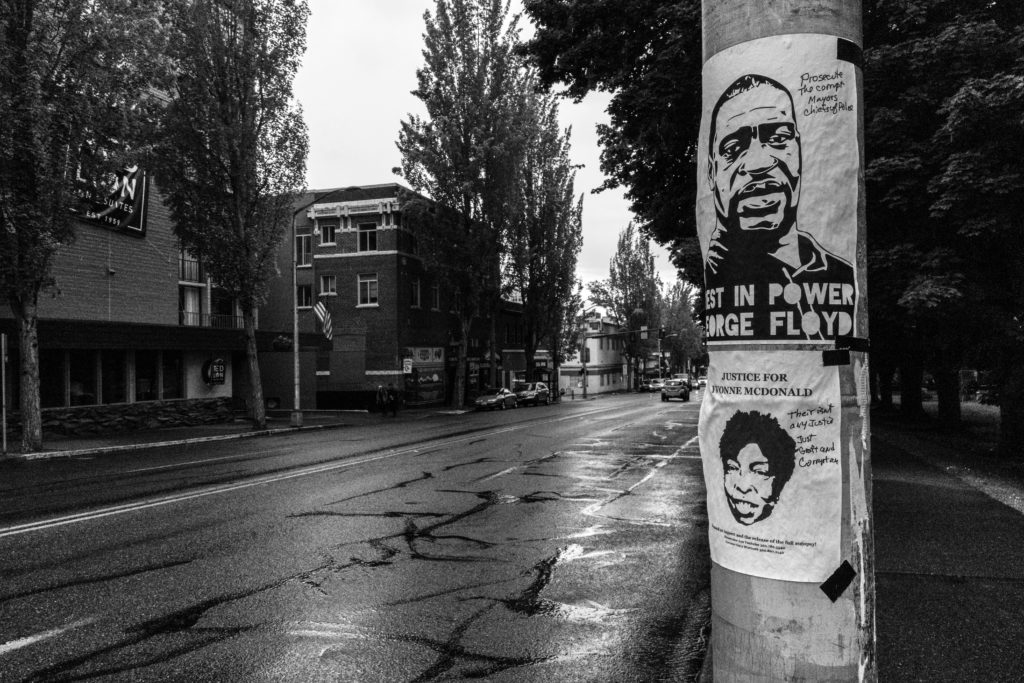
Photo by Simon Daoudi on Unsplash
With knee on neck
And I can’t brea..
He breathed his last
And he can’t see
What happened next
What happened next
Was that here and there
And everywhere
People realised that
They could not brea..
Until now they
Could not see
That it was because of
Neck and Knee
All over the world
They came in hordes
Black Lives matter
They all roared
Or Brown
Or Pink
Or whatever else
It hardly mattered
What they said
Because the knees were shaking
The shackles were breaking
The necks were straining
The necks were gaining
The knees were deigning
To listen for once
To those whom
They never heard
To those to whom
They had always said
It’s your damn neck
Pressing too hard
Pressing too damn hard on my knee
To those whom they never saw
Even when knee
Was pressed down hard
On neck
I can’t brea..
Was a visceral cry
It let so many others
Breathe at last
And amidst all the
Bangs and clatter
Amidst all the
Twitter chatter
One thing stood out
Each life matters
Each life matters
To he who lives it
Each death matters
To he who dies it
Each life should matter
To you and to me
Each death should matter
To humanity

Photo by Emily Morter on Unsplash
On our first day at
A new school
I met
Berzee, Munaf, Nandan
Venkatesh, Chitcharan, Jude
During recess
After
What’s your name?
We circled warily around
Each other
Finding out
Where someone lived
Did he come by the school bus?
Did he have a car?
Who would take the
BEST bus home with me?
Who had an older brother in school?
Who should I partner with
To play carrom?
What tiffin had they each brought?
Today I look back
And wonder
At those questions
And wonder of wonders
At those innocent times
When after
What’s your name?
There was not
The merest thought of
The menacing follow-up question
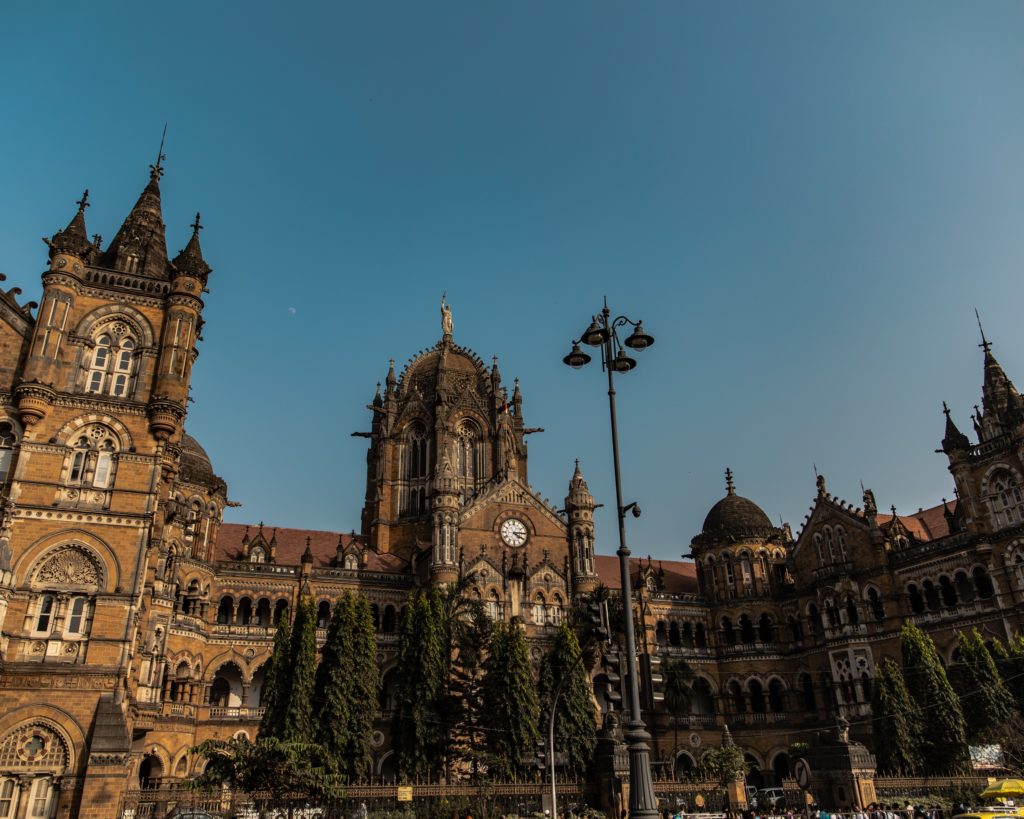
There used to be
A newspaper vendor
Sitting on the pavement
On Colaba Causeway
From whom I used to buy
The Evening News of India
For my father
Making sure to finish
Busybee’s Round and About
While walking home
He disappeared for weeks, once
And on his return I quizzed him
Kahaan gaye the aap?
He said, muluk me gaya tha, baba
Where was that?
Uttar Pradesh ki Meerut ke paas
Ek chota sa gaon
Aur gaon ka naam?
Rampur
That was possibly
My first encounter with migrants
But when I started asking
I found that
The Kolhapuri chappal-maker
Near Regal cinema
Was actually from Kolhapur
The shoe-shine boys at Churchgate station
Where Fr Netto used to send us
If our faces weren’t reflected in our shoes
Were from Dhule, Amalner, Erandol. Pachore
The taxi drivers with names like Talwandi and Gill
Were from villages of those names in Punjab
The Irani pao-seller was
Of course from Iran
But more recently
Had come from Valsad
Where was that?
Gujarat ma, dikra
Vegetable and Fruit sellers were from
Unheard-of villages in Bihar and Uttar Pradesh
A veritable geography lesson on the streets
The smuggled TDK and Sony cassette sellers
On the pavements of Flora Fountain
Were all from Kerala
They were the hardest bargainers of them all
But peppering their Tamil-Malayalam with
Mone this and Mone that
Would make me feel
That what I had bought
Was a steal
The Matunga-wala
Who cycled from Matunga
With particularly Tamil goodies
Arisi appalam and kaara boondi
Was of course Tamil
It seemed to me then that
Everyone in Bombay
(With the possible exception
Of Bal Thackeray)
Was a migrant
Including me

Photo by Art Lasovsky on Unsplash
A poet’s vocation
Is dangerous
You stand to lose
Your liberty
Perhaps your life
Worst of all
Your friends
It seems to me that
Nowadays
I just need to
Shake my head
To lose a friend
Should I then
Keep nodding to
Keep them?
We hope you have enjoyed reading Fundamatics, the award-winning ezine published by the IIT Bombay Alumni Association, envisioned as one that is by IIT Bombay (IITB) alumni, faculty and students, and for the same vast community. And, the best part of Fundamatics is that it is completely free and can be accessed by thousands of our alumni who are spread all over the world. But this does not mean that we do not incur any operational costs in bringing the ezine to you. Your financial support can mean that we can continue to remain in circulation and “free” to you, our readers.